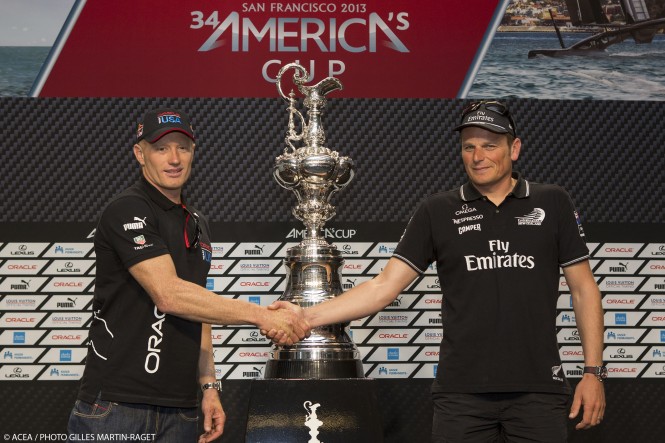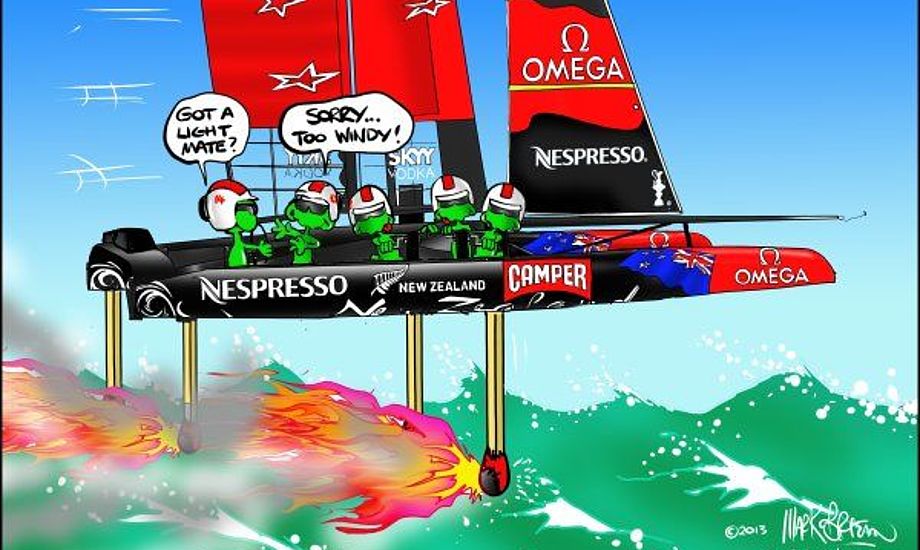New York Times: Australien mod New Zealand
- They probably both want to kill each other, siger Glenn Ashby med et glimt i øjet om AC-skipperne Jimmy Spithill og Dean Barker. En kamp mellem Australien og New Zealand. Læs artikel. Kamp i aften.
SAN FRANCISCO — This America’s Cup is, of course, about much more than Jimmy Spithill and Dean Barker.
There are 11 sailors on each fast and fragile 72-foot, or 22-meter, catamaran and scores of other individuals providing tactical, technical and logistical support behind the scenes.
There is also the Bay Area wind, which, with its many fluctuations in the past week, has seemed intent on delaying Team New Zealand’s would-be celebration as long as possible.
But the red-haired, hard-charging 34-year-old Spithill and the sandy-haired, soft-spoken 41-year-old Barker remain front and center: the men whose images — crash helmets in hand and game faces in place — greet spectators on side-by-side posters at the entrance to America’s Cup Park.
Oracle Team USA’s Spithill and Team New Zealand’s Barker are the skippers and helmsmen; the men at the steering wheels; the men who take plenty of quality advice but ultimately make the split-second decisions on their own that can often make the difference between winning and losing.
Barker had the big edge with New Zealand leading, 8-5, but Spithill was hardly conceding defeat.
He remains the bigger presence in any room and the livelier interview: one who never seems to flinch at a potentially awkward question.
“Actually I love it,” he said.
Barker, in the same scenario, is prone to big and obvious exhales and body language that makes it clear he would much prefer to be back at sea.
“They are obviously quite different personalities,” said Iain Murray, the America’s Cup regatta director. “But they both have the drive and hunger, and they’ve left nothing to chance.
“At the helm, Jimmy is probably a little closer to the limit than Dean, and Dean is wonderfully consistent, so I think they are both wonderful professional sailors with tremendous skills.”
Barker has been with one team through his whole Cup career, which began in earnest in 2000 when the Kiwis’ star helmsman and skipper Russell Coutts generously handed Barker the helm for the fifth and final race in which New Zealand completed its sweep of Prada Challenge.
Spithill has been an Australian sailor of fortune, driving for four different teams in part because no Australia-based syndicate has taken part in the Cup since 2000. While Barker is a big star in his country, Spithill is not yet one in his.
Though the New Zealand Herald reported this week that both Barker and Spithill own property on the same street in Auckland’s most expensive suburb, Herne Bay, the two men come from very different backgrounds.
Spithill grew up north of Sydney in a milieu he describes as modest. Barker comes from affluence in Auckland. His father, Ray, owns a large chain of clothing stores, and Barker attended an elite school that also produced the future America’s Cup helmsmen Chris Dickson and John Cutler.
“I think we’ve taken quite different paths to get where we’ve got to,” Spithill said. “Dean comes from quite a privileged family.
“I’ve sort of come from more humble beginnings and have sort of had to fight and work my way to where I am,” he said.” But I really respect him as a competitor. He’s also got a very, very good team.”
That team, largely composed of New Zealanders, includes two Australians whom Spithill considers close friends: Glenn Ashby and Adam Beashel.
“Those guys are really good mates of mine, so you never, when you have a couple of really good mates, let anything get between that,” Spithill said.
Spithill worked in the Beashel family boatyard in Australia when he was a boy and became enamored of the America’s Cup after Beashel’s older brother, Colin, won it with Australia II in 1983.
Ashby was the multihull expert who was essential to Spithill making the transition from expert monohull helmsman to someone capable of steering the huge and volatile 90-foot trimaran that Oracle deployed when it won the Cup in 2010.
But Ashby, who said he was eager to remain closer to home in Melbourne, chose to coach Barker and work with Team New Zealand for this Cup, and his expertise and enthusiasm have clearly been critical to the Kiwis’ and Barker’s success.
“Glenn was tasked in a lot of ways with bringing the sailing team up to speed and particularly me on my sailing skills,” Barker said. “I did a lot of sailing with Glenn in the A class and went over to the Australian nationals and all sorts of other events and just by spending hours and hours with Glenn and on the water was able to learn to adapt to what was involved to sail that boat well.”
Spithill had raced multihulls as a youngster, but Barker had sailed them only on a recreational basis — and rarely — before making the transition for this Cup.
The two have been rivals at this level before. At the 2007 America’s Cup in Valencia, Spain, Barker was at the helm for Team New Zealand and Spithill was at the helm for the Italian team Luna Rossa Challenge.
Those teams faced off in the final of the challenger series, known as the Louis Vuitton Cup. Barker and Team New Zealand prevailed and eventually lost in the America’s Cup match to the defender, Alinghi.
But in the buildup to this Cup, Spithill and Oracle were the ones who routinely got the better of the Kiwis in the smaller AC45s that were used as training boats for the AC72s.
“Over the past two years, anytime we’ve gone head to head in a match race in a multihull against Dean Barker we’ve beat him,” Spithill said shortly before this Cup match began. “So the guys are proud of that achievement. But this is a new game.”
So it has proved, and the tension has been palpable between Barker and Spithill from the start.
“They probably both want to kill each other,” Ashby said before it began, speaking — one hopes — figuratively.
On Friday, after Oracle had cut Team New Zealand’s lead to 8-3, Barker and Spithill were asked at a press conference if this contest was “getting personal.”
Barker exhaled, laughed (sort of) and answered, “It’s, I guess, your normal Australian, New Zealand rivalry; probably says enough.”
Spithill, true to form, elaborated further. “Look, there’s fierce rivalry between Australia and New Zealand in sport,” he said.
“I mean, it’s crazy how deep it is, but on the other side, if you look at the history of Australia and New Zealand, if either side is in trouble, we are the first guys there to go and bail them out and vice versa.
“If we’re ever in a time of need, we’re the first ones backing each other up. But the fact is we’re in a battle now and honestly we both want to kill each other, and that’s sport.”



